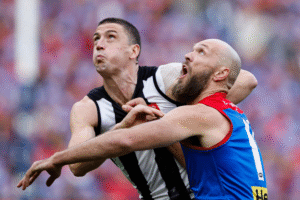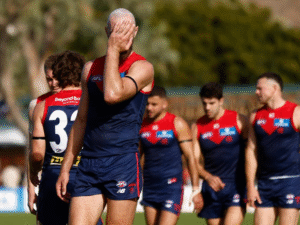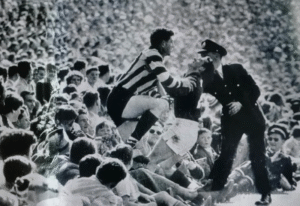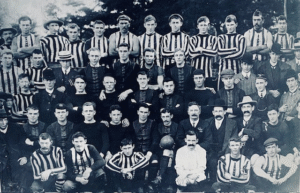Round 13 – Melbourne V Collingwood
Great Game, Wrong Result
Liam Chambers
Good start for the Dees with both sides even at quarter time
Arguably the most important game of our season is the Round 13 clash against Collingwood. It’s definitely the most passionate. This time last year we were at the start of a downward spiral where we only won four of our last twelve games. The Pies beat us by thirty eight points on that occasion; our only consolation being Collingwood also failed to make finals that year.
This year has been a bit of a rollercoaster for us, with wins over Fremantle, Brisbane and Sydney, after a disastrous five losses in a row to start the season. Despite last week’s defeat at the hands of St Kilda, we have been playing some impressive footy lately. Also, the underdog status suits us well, and I was expecting a performance along the lines of our rampaging final quarter victory in Round 10 over the reigning premiers.
Tom Sparrow has kicked some great goals from the 50m arc, and he did it again to give the Demons their first major on the scoreboard. Melbourne was playing competitive footy and looked impressive, tackling hard and restricting the Pies from playing their favoured transitioning game.
In fact it was nearly twenty minutes into the first quarter before Collingwood registered their first goal, after Daniel McStay received a handpass in the pocket and kicked from 40m, sending the ball through the uprights.
With just under four minutes to go, Jamie Elliot wrong footed the Dees’ defence and took an uncontested mark in the pocket. With his 2025 record of successfully converting set shot opportunities, it was a foregone conclusion that Elliot would hit the target from 35m.
Melbourne’s response was immediate. Having won the hitout, they were straight back down the ground where Koltyn Tholstrup was award a free kick for his tackle on Harry Perryman. The young forward then went back and made sure with his 45m set shot.
Collingwood gain the advantage with a little help from their friends (in yellow)
With the Demons languishing behind Collingwood in the kicking efficiency stats, Kozzie Pickett’s soccering kick off the ground from 45m out looked more an action of hope than intention, but when the sherrin crossed the line, we all knew that he meant to do it. Unfortunately, the scores were back to even steven when Beau McCreery’s running kick from 52m also found the space between the posts.
Collingwood fans were expecting their team to be several goals ahead by this late stage in the second term, but twenty minutes were gone before they managed to kick a second major. Steele Sidebottom’s kick from just inside the 50m line, made it a four point game in favour of the Pies. Then two minutes from half time, that annoying rule about not moving off the mark (except when it favours the Dees) gave William Hayes a relatively easy set shot in front of goal.
Not to worry though, as Kozzie responded by scooping up the bouncing ball, then turning and snapping from 30m out to notch up his second of the quarter.
The Umpires were fast proving themselves to be Collingwood fans when Jake Melksham was penalised for being pushed into Jeremy Howe by Darcy Moore; it was beginning to look like serial favouritism. Just saying…
Then, of course, Collingwood got the ball back up to their end of the ground and Tim Membrey marked it inside 50. His kick after the siren went through to make it an eight point game at the main break.
Demons win the quarter by a single point.
The Pies had the perfect start to the second half when Brody Mihocek marked in the pocket and converted the difficult 35m set shot. When Ned Long snapped a goal from 15m, it seemed that Melbourne’s hopes of causing a major upset was dead, buried and cremated.
The Demons of Rounds 2 to 5 would have by now been packing their bags and heading for the exits, after trailing by twenty points to the competition leaders. The Demons of Round 13 however are made of much sterner stuff and decided to ignore the negative vibes buzzing around their heads, instead choosing to get straight back into the game.
Having won the hitout, Christian Petracca and Clayton Oliver combined perfectly to get the ball inside 50, where Jake Melksham ran out to take the mark. His set shot was clean, and it was back to fourteen points. Next it was Bailey Fritsch’s turn to mark the ball in a scoring position. He was thrown to the ground after the mark and awarded a 50m penalty (the good kind, as it favoured us).
Now it was a seven point game. The Dees’ momentum was temporarily halted when Bobby Hills legs taken in a tackle inside 50, and the medium forward didn’t waste his opportunity
With just over a minute left on the clock, Harrison Petty was “surprisingly awarded a free kick” in front of goal after being held while attempting the mark. His set shot was on target, and we were back in the competition.
So close
When Bailey Fritsch opened the scoring, four minutes into the final quarter, Collingwood and Melbourne fans alike were wondering if they were dreaming.
Ed Langdon had been making a terrific contribution to the Demons’ game, shadowing Nick Daicos all afternoon. Somehow the Umpires had missed what a great job Ed was doing in restricting Collingwood’s best player in the first half, but were certainly making up for it in the second. Langdon was admittedly in the wrong, but Daicos was awarded a very generous 50m penalty, ensuring the goal was a fait accompli.
Despite the setback, Bailey Fritsch quickly returned the margin to a single point when he snapped from the top of the square, after Jake Melksham had punched the ball directly into his path. Then it got even better when Kozzie collected the bouncing ball and snapped from the pocket, landing the ball into the square and across the line.
Just when it looked like we were on the verge of an upset for the ages, Daniel McStay took a contested mark and converted from 20m, effectively ending the fairytale.
It was a fantastic performance from Melbourne and every fan will be proud of the players for the effort and determination they showed against a side that will probably win their second premiership in two years.
Next, we travel to Adelaide where we face the unpredictable Power. It won’t be easy but if we show the same commitment against Port, then I sense another victory is on the cards for Melbourne.
Go the Mighty Dees!!!







 Follow us on twitter
Follow us on twitter Join our facebook group
Join our facebook group